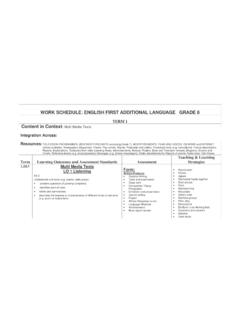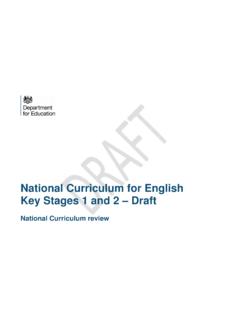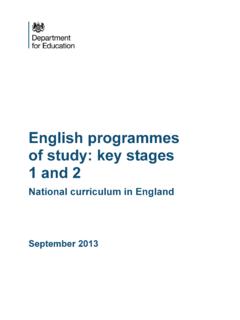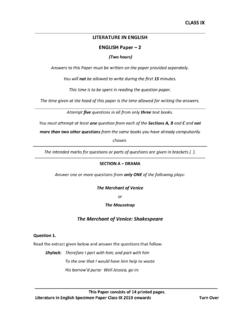Transcription of AP English Literature and Composition Syllabus 2016-2017
1 1 AP English Literature and Composition Syllabus 2016-2017 A note about academic integrity: Academic integrity means honesty and responsibility in scholarship. Academic assignments exist to help you learn; grades exist to show how fully this goal is attained. Therefore, all work and all grades should result from your own understanding and effort. You are expected to demonstrate the upmost integrity. The purpose of this class is to push you as a learner and to prepare yourself for college work. AP English Literature and Composition is a rigorous course designed to provide students with the intellectual challenges and workload consistent with a typical undergraduate university English Literature course. The works of Literature chosen and Syllabus are designed in accordance with the recommendations of College Board. Therefore, reading assignments may involve mature events, themes, and language.
2 If you or your parents are not comfortable with this, please take another class. Students take this course not only because they are academically able but also motivated, self-directed learners. This course will prepare students to enter college and take the AP English Literature and Composition Exam given in May. All students are expected to take the AP English exam as the course is directed to this assessment. The reading and writing workload will be very extensive. In order to get as much possible out of each class session, it is imperative that all reading and writing be completed before class. This course follows the curricular requirements outlined in the AP Course Description. A general summary of this description is as follows: The purpose AP Literature and Composition is to engage students in the careful reading and critical analysis of imaginative Literature .
3 Through close reading of the texts listed below, students deepen their understanding of the ways writers use language to provide both meaning and pleasure for their readers. As they read, students consider a work s structure, style, and themes as well as such smaller-scale elements as the use of figurative language, imagery, symbolism, and tone. Writing assignments focus on the critical analysis of Literature and include expository, analytical, and argumentative essays. While the bulk of student writing will be critical analysis, creative assignments will be given so students can use and practice the literary elements studied. Course Objectives: (taught and practiced throughout most units) 1. Students will read and analyze significant works of Literature and use these works to prepare for the open-essay exam question. 2. Students will learn and practice annotating text 3.
4 Students will keep a reader s notebook in which they write synapses, various ideas, notes, generalizations, and specific details related to the works the class is studying. 4. Student will find and define (accurately, for the text) new vocabulary words and keep these in a notebook. This notebook will be utilized when completing reading and writing assignments, including revision activities. 2 5. Students will become familiar with a variety of literary styles while considering novels, drama, short stories, and poetry. 6. Students will become familiar with a variety of poems from different eras and poets, and learn a variety of poetry terms 7. Students will read and explore a poem s meaning and the effect of poetic devices 8. Students will learn and apply various critical theories 9. Students will develop formal writing skills and practice writing research papers, critiques, abstracts and essays.
5 10. Students will learn the wording of a PTS (Paragraph Topic Sentence) 11. Students will write timed essays responding to AP exam style prompts that demonstrate close reading skills and analyze understanding of theme and writer s craft. 12. Students will develop strategies for finding their voice in their writing. 13. Student will peer edit, conference with the teacher, and revise and their work utilizing the aforementioned as well as self-evaluation through rubrics/scoring scales (AP, teacher created, or class created) 14. Students will formally present ideas and lessons to classmates on selected topics in Literature and poetry. 15. Students will improve their skills in answering multiple-choice questions based on prose and poetry texts. 16. Students will learn to perfect their sentences through in-context grammar and structure lessons derived from their own writing.
6 Writing Expectations Students will write at least one essay for every unit, often in response to a former AP exam prompt selected for that unit. Students will also write timed and un-timed style analysis pieces from selections of prose and poetry. In addition to responding to AP prompts and poetry, students will also write a research paper centering on a social justice issue. Student presentations that involve writing are also a component. All untimed essays must be typed and include a properly formatted MLA works cited page. Writing assignments for the year focus on different aspects of college-level writing. Persuasive and expository essays will include a focus on sound thesis, strong paragraphs with topic sentences, detailed evidence, and specific quotations for support, sentence construction, transitional sentences, strong conclusions and vocabulary fluency.
7 Students should maintain a portfolio of their essays over the course of the year to document their improvement and to encourage thinking about their writing. The use of various rubrics, including the AP rubric, will be used and saved with each piece. Saving and reviewing essays and rubrics will also assist in preparation for the AP exam. Grading Grading for each intensive assignment will be based on expectations outlined in the teacher or student created rubric. Daily or smaller assignments will have a point value assigned to each 3 depending on the amount of work and level of skill required for successful completion of the assignment. You will have approximately 250 points per nine week grading period. Reading List (Not including summer reading) *note: When novels are a part of a larger unit, the novel will be studied in depth but analysis will concentrate on the unit objectives.
8 Jane Eyre Charlotte Bronte The Kite Runner- Khaled Hosseini Farewell to Arms Hemingway Othello or Hamlet- William Shakespeare A Doll s House Henrick Ibsen If time: The Glass Menagerie Tennessee Williams or The Cherry Orchard - Anton Chekhov Other selections from the textbook: Arp, Thomas R. and Johnson, Greg. Perrine s Literature : Structure, Sound and Sense. 10th ed. Boston: Wadsworth Cenage Learning, 2009. Summer Reading: (Frankenstein and Their Eyes Were Watching God, and The Five People You Meet in Heaven by Mitch Albom) Assignment #1 Read Frankenstein by Mary Shelley and Their Eyes Were Watching God by Zora Neale Hurston. Complete Data Sheets for those books. Due the first day of school - August 31. Also, this summer, compile all of the data sheets you have done throughout high school. Assignment #2 - 1) Write a 3-4 page essay that analyzes the idea that one can significantly influence the life of another in The Five People You Meet in Heaven and one other summer reading book.
9 Be sure to explain how the main character in each impacts another character. Is the other character hindered or helped through this influence? Does the main character use his or her influence for good or evil? In what ways? What is the author of each book saying about the role or responsibilities an individual has to fellow humans? Use 4-6 pieces of textual evidence to support your thoughts. Due Friday, September 2th. Formatting: 3-4 typed pages, double space using paragraph/ line spacing in Word (not hitting enter twice), size 12, Times New Roman. September/ October Unit 1: The Elements of Fiction and Writing about Literature (9 weeks) The texts: selected stories from Perrine s Literature , Structure, Sound and Sense, and The Kite Runner. Unit Expectations: a.) To review and teach the fundamentals of essay writing with a focus on form, clarity and purpose including developing a thesis paragraph.
10 B.) To demonstrate an approach to analyzing and discussing the writer s craft evident in selected 4 literary works including plot development, characterization, theme, symbolism, tone, and point of view and stylistic elements such as diction, syntax, and speaker. c.) Student will understand the following concepts using Perrine s Literature : close reading, plot and structure, theme, tone, characterization, and point of view. d.) Students will define and demonstrate understanding of vocabulary including literary forms and literary terms. e.) Students will analyze the elements of fiction found in longer works These concepts are demonstrated with the novel listed above and short fiction stories from Perrine s Literature Evaluation: A past AP test prompt about symbol Other evaluations for this unit include two on-demand writing prompts from past AP Tests in which students will use the novel from this unit, paragraph writing, short answers, and a shorter essay comparing forms of writer s craft evident in two short stories.








